Whenever we talk about low quality sneaker materials, one example that gets brought up often is non-SB Nike Dunk leather. The lowest-tier Dunks are seemingly plagued by thin, shiny, plasticky leather. In this article we will take a look at whether you should let a perceived lack of quality stop you from copping pairs you like.
The TL;DR here is that yes, the lowest level of Dunks use a shiny, unattractive leather quality. But quality alone is not the reason one buys sneakers. On a certain price tier, quality may be negligible, but look and colorway outweigh it in importance.
Nike SB Dunk Quality vs Nike Dunk Quality
Generally speaking, Nike SB Dunks have the edge on material composition and quality vs Non-SB Dunks. While the quality isn’t always great on either, SB’s tend to get beefier materials. This makes sense, as SB’s are built to be skate shoes.
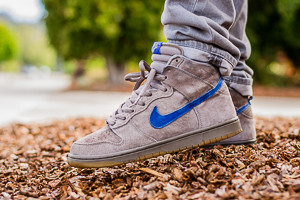
The materials used on these SB Dunks
are LEGENDARY
If you buy some “regular” Dunks, you might think you are immediately in on the trend. I mean, you’re wearing a well-known model associated with streetwear that has enjoyed a resurgence in popularity in the last few years.
Unfortunately, if you post up a pic of your new Dunks on social media, depending on what those Dunks are, you may get some negative comments about “plastic leather” or “would have been better as an SB”.
This is because SB Dunks typically have more thought put into the material composition of their sneakers, even at the lowest tier of release. While both models can step it up in terms of collaborations and special or premium releases, SB’s seem to be better at every price point as far as materials.
That’s not to say that SB Dunks always have good materials. Only that side by side with the equivalent tier of non-SB Dunks, SB’s appear to be more solid by default.
The catch is, SB Dunks are relatively harder to get these days compared to non-SB’s. Additionally, SB’s are known for the extra padding, especially in the lows. This is to help the sneaker be better for skating. If you prefer a slimmer silhouette, the aesthetics of the SB Dunk might not work as well for you as the normal, less padded non-SB Dunk.
Nike Dunk Leather Composition
Unless explicitly mentioned by Nike, I operate under the assumption that Nike Dunks are not made with 100% full grain leather. Most sneakers that cost around $100 are not going to have anywhere close to a high quality leather. However, they may be treated with some textural components that change the perceived quality of the sneaker.
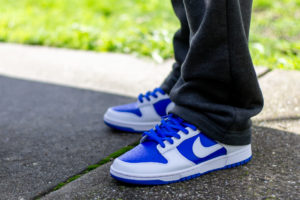
Sneakers like these don’t bank on materials,
and you shouldn’t expect them to for $115!
Typically, saying a shoe has “quality leather” indicates that it has a full or top grain leather. You might find materials like that on a pair of nice boots or dress shoes. This type of material tends to have a very natural look as far as wrinkles, textures and spots. Full grain leather can even stain! Sneakers on the other hand mostly use lower quality leathers and synthetics.
In order to give the illusion of a higher quality leather, companies like Nike typically coat the lower tier leather with different paints and texturings. Hence the “overtumble” and “shiny plastic” textures I refer to on this site all the time. The leather under the coating could be mostly real, synthetic or a composite of different bits of leather of varying quality.
Real “Quality” Leather vs What Sneakerheads Think Quality Is
Sneaker fanatics love to go off about quality. However, I would argue that most of what sneaker collectors view as “quality” is based on perception, rather than an actual higher grade of materials.
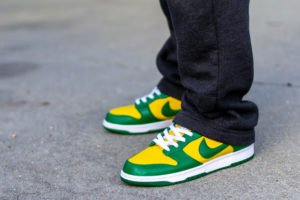
This “SP” release has softer leather. While
it’s “better”, that doesn’t mean it’s necessarily
a high quality leather.
Many sneakerheads think that nice, soft leather indicates a higher quality level of materials. This is true to an extent, but that doesn’t mean it’s “good” leather. In fact, it could be the same synthetic or low quality leather with a convincing coating added to it to make it seem “premium”.
So when a sneaker collector says something has “good” materials, what they really mean is that the materials seem soft and buttery for a sneaker. We are not saying that the sneaker is rocking full grain leather. “Good” materials in sneakers translate to something that is pleasing aesthetically and texturally, not the actual literal material grade.
Material Quality Isn’t As Important As Sneaker Collectors Think It Is
Sneaker fans have different needs for the leather used on sneakers vs those found on a nice boot or pair of loafers. The leather needs to resist creasing and staining and hold up to all-day casual wear without being heavy or uncomfortable.
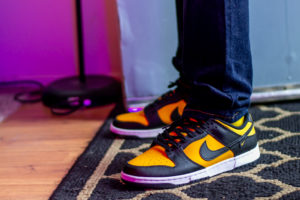
This shoe is priced like a “premium” sneaker
but the only extra is the little tag coming off
the side. Leather quality is still super basic.
While some sneakers such as Made Line New Balances are to a degree sold based on the idea that they use better materials, most Dunks aren’t sold with this in mind. They are not billed as a “high grade materials shoe”.
Instead, most kicks at the Dunk price point are built to be easy to rock with few frills on materials. Even sneakers that Nike marks as “premium” might not have upgraded leather. Often times, the premium label refers to some extra on the sneaker. This could be softer materials, but also could refer to a special graphic, extra laces or hangtags, or any other combination of upgrades.
Collabs and limited Nike Dunks sometimes have more thought put into materials. Other times, more attention is paid to extras or other elements on the release rather than upgraded leather and suede.
What I Look For In Basic General Release Nike Dunks
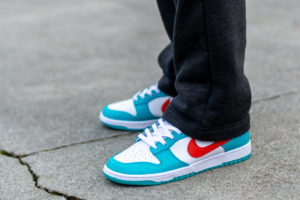
I got these strictly based off the colorway,
and I knew off rip the materials would be basic
In my view, knowing that most sneakers at this level are not using anywhere near a top tier leather, I mostly look at the look of the Dunk overall. Do I like how it looks enough to buy it? If so, great. That’s about all I need to know on a Dunk.
While it would be nice to have softer leather every time, like that found on “SP” releases like the Brazils, I realize this isn’t expected or even common on sneakers that cost around $120. At this price tier, nicer texture on the leather is more of a bonus than a must.
